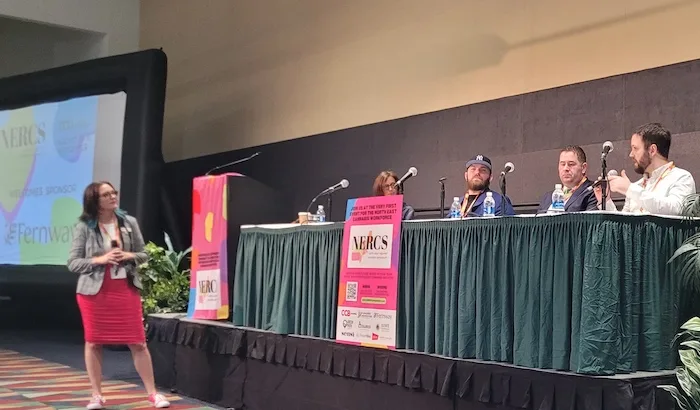
“I still work here … The biggest thing now is regulations. And getting that stuff done.”
For some attendees of the first North East Regional Cannabis Symposium held at the DCU Center in Worcester this week, it was jarring to see Massachusetts Cannabis Control Commission Exec. Director Shawn Collins scheduled to speak on Thursday’s keynote panel. His employment status had been unclear since an announcement at the CCC’s July 28 meeting which shocked members of the public and commissioners alike …
“Before the second May meeting of the commission,” CCC Chair Shannon O’Brien said, “[Collins] said to me, Today I am going to announce that I am leaving at the end of the year. And that I intend to take my family leave, having just had a new baby, starting in September and I will leave [the commission permanently] after the regulatory process is done.”
O’Brien continued at the July meeting, “I asked [Collins] not to announce that day [in May]. It was a little bit out of the blue and I said, I would ask that you wait. We are in the process of hiring a new chief people officer, we’re hiring a new general counsel, we are depleted in terms of some of our top management and staff to not only help us get through regulatory writing but to exercise the important responsibilities that we have.”
The news, which came on a Friday afternoon, reverberated beyond the Mass cannabis industry, with disagreements between commissioners and other CCC behavior even reaching national weed publications. Many latched onto O’Brien’s comments that “we are in crisis right now as a commission,” and regarding a “need to make sure that we can manage through this regulatory process.”
Collins is a central figure at the CCC, often presenting data at meetings and demonstrating his attentiveness to various matters of business before the fast-growing agency. “What I do functionally,” he said at NERCS this week, “is to be an intermediary in a lot of ways. So that means if I’m hands-on in redlining [draft regulations], then I’ll do that, or also what I do a lot of times is quality control and check things at the end.”
Despite the uncertainty that followed the July dustup, regulators advanced new draft rules around Host Community Agreements (HCAs) and municipal equity on deadline. And at the conference in Worcester on Thursday, during a panel discussion titled “Ask The CEO” alongside industry leaders who the CCC regulates, Collins gestured around the elephant in the room and proceeded with business as usual. The executive director answered questions about state resources, compliance expectations, wait times in the licensing process, and agency expenditures.
“Scrutinize our budget,” Collins said. “We publish it, it’s on our website.”
Following the panel, I asked him flat out if he remains the CCC’s executive director. To which Collins replied in the affirmative: “I still work here.” Adding, “Personally, we had a baby as a family, and that’s essentially the explanation—parental leave. Other than that, I’m working full-time, on the clock.”
He continued, “The biggest thing now is regulations. And getting that stuff done—HCAs, municipal equity. Social consumption’s coming too, and that’s a monster. There is no simple way to do it, it’s a very complex issue.”
Asked if he feels any added pressure with New York offering a program that allows cultivators to partner with retailers to present and sell their products at non-storefront locations, including on licensed cannabis farms and at approved events, Collins said, “I’m a competitive person by nature. And also Mass is my home state, so I want to see us do well. If anything, we have an opportunity to keep the industry safe and accessible, but if we’re also sincere about the effort to get smaller players in here, then success matters.”
During his panel, Collins decried the prospect of pharmaceutical companies entering the market and “really taking away from the progress made in the cannabis industry up to this point.” The executive director also said he’s working on issues like insurance, business development, and small but critical changes like the rule which requires delivery companies to dispatch two employees on all orders. He said the expense of that rule which is prohibitively costly to operators was “foreseen,” but noted, “now they’re feeling those pressures.”
As for his relationship with the commission … Journalist Eric Casey from Burn After Reading, who I spoke on a media panel with earlier on Thursday, asked the executive director if he wished to comment on O’Brien saying he planned to vacate his post. “I prefer not to get into that,” Collins said. “I’m working, I’m here. The rest of it is a private conversation.”
Prior to the July meeting heard ’round the industry, commissioners met in executive session to discuss personnel matters, but those conversations are closed to the press and public. Per statute, commissioners appoint the executive director, who “shall serve at the pleasure of the commission, shall receive such salary as may be determined by the commission, and shall devote full time and attention to the duties of the office.” Collins is the first appointee to the position, and has been there since the agency’s founding in 2017.

























